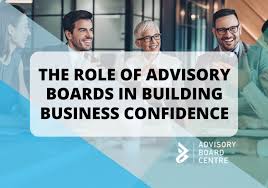
Unless you are truly running a one-man operation, every business should have a Board of Advisors. This group should be composed of people you know and trust but they must also be the right people. Each Advisor must have your business’s best interests at heart but also be able to assist you in planning, solving tactical problems and addressing management issues.
Start With An Evaluation of the Board
How should the Board function? What type of Advisor is desirable? Individuals with varying backgrounds that can apply their experience and best practices to the business’s goals and plans.
The Board should consist of at least five, but no more than seven advisors. The Board should meet regularly – preferably monthly but at minimum quarterly. The meetings should take place is an informal setting but one that is private and without disturbance. Perhaps a private room in a restaurant or suite at a conveniently located hotel. Dinner should be provided for the Advisors after the meeting. You, as owner and head of the Board, should provide each meeting’s agenda and take meeting notes. There should also be Committees established, for example, finance, marketing, and compensation are typical.
What Types of Advisors are Best
You need a mix. But at least one Advisor should have a full understanding of the financial reports and what the numbers “are saying”. You’ll also need several with organizational and management skills. Normally, the business’s Accountant, Insurance Agent, Vendor/Suppliers, Lawyer, Trusted Customer, Banker, Retired Business Executive, Web-site Developer, are typical examples of people you would recruit for the Advisor Board. They are familiar with the business, bring expertise, and have a vested interest in the business’s survival and growth.
As technology advances you need people on the Advisory Board that are tech-savvy and understand how technology impacts your business via operational efficiencies, staff productivity, and cybersecurity. Choose advisors that have already achieved what you are trying to and learn from their successes and mistakes.

Re-evaluate Each Advisor Annually
The Advisory Board will change over time. Each year determine if each member is aligned with your goals and if they meet the business’s needs. Don’t make the mistake of just adding on more advisors and keep all the old ones. The number of advisors should remain constant at either five or seven, including yourself. View the selection process as team building. Selecting the right advisors is just as important as selecting the right employees. The wrong or misplaced advisor will be a waste of time and money for both you and the advisor.
Your Selection Process
- Have your mission and goals set before selecting a board member. Articulate this to perspective advisors in addition to your customer profiles and major competitive threats.
- Look for ‘doers’ and ‘achievers’ just as you would when hiring employees.
- Have an on-boarding process. Make sure each advisors has a clear understanding of the business. What is your brand strategy. What do you want the business to achieve. Where he/she fits into that strategy.
- Look for diversity, energy, and clear perspective. Community involvement is a great plus as are individuals with broad and unique backgrounds.
- Advisors that can adopt to new practices and keep pace with changing markets and consumer behaviors.
Every business should have an advisory board. They are an important but sometimes overlooked asset to the management and growth of the business. They bring expertise, knowledge, and unique skills that would otherwise be unavailable to the owner of the business. If you don’t already have an advisor board establish one. Choose wisely and the experience will be a valuable one for you, as well as, the advisor.




0 Comments